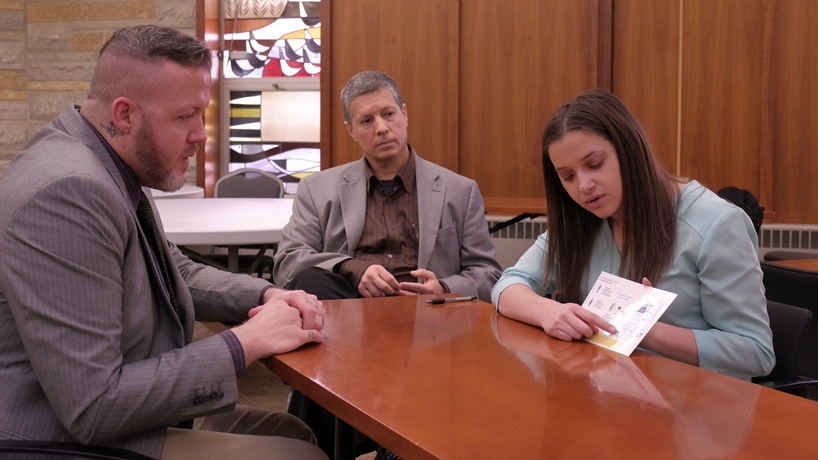
Greg Faupel (far left), Joe Pickard and Gina Garbo conduct a role-playing exercise to practice effective Screening, Brief Intervention and Referral to Treatment techniques. (Photos by August Jennewein)
Graduate student Greg Faupel understands the importance of using tact and natural conversation when broaching difficult topics with people struggling through addiction.
“When working with clients, you have to put yourself into their shoes,” said Faupel, who is pursuing a master’s degree in the University of Missouri–St. Louis School of Social Work. “Some clients need to seek immediate attention for their substance abuse issue, yet they may not be ready for commitment or fearful of judgment. Using motivational interviewing techniques helps the client find self-determination to move forward.”
Faupel believes a focus on empathy will strengthen his skills as a case manager and allow him to better assist clients who are on the cusp of addiction navigate drinking and drug use.
The School of Social Work’s newly implemented Screening, Brief Intervention and Referral to Treatment training program made possible through a federal grant will aid Faupel in meeting his goals.
SBIRT is an approach to substance and alcohol abuse intervention that can be utilized across a variety of social work specializations and settings.
School of Social Work faculty members Joe Pickard and Sharon Johnson, in conjunction with faculty from Saint Louis University, recently secured the $880,000 grant through the Substance Abuse Mental Health Services Administration. The grant will be disseminated over the course of 3 years and cover the costs of preparing courses, hiring professional role-play actors and developing community events.
“SBIRT is for people who might slip through the cracks,” said Pickard. “We teach BSW and MSW students basic interviewing skills like using open-ended questions, affirmations, reflections, summaries and ways to make clients feel comfortable and willing to share. The screening program takes these skills and puts them into a framework students can then take with them and use in their professional careers.”
According to Pickard, SBIRT training will be integrated into the curriculum of all BSW and MSW students through the use of a a four-credit-hour online SBIRT course developed at UMKC. MSW students will demonstrate their new skills with an interviewing role-play that will be filmed and evaluated. For further practice and application, a one-credit-hour elective will be offered that uses actors for simulations of SBIRT interviews.
“It’s different hearing a professional suggest that a person should seek treatment instead of a friend or family member,” Pickard said. “And for many people, this might be the first time they’re alerted to red flags concerning their substance usage. We want to help them to nip it in the bud before it gets too bad.”
Gina Garbo, who will use her MSW to help adolescents navigate the foster care system, attests to the value SBIRT training has added to her education.
“The SBIRT training enriched my education because it was a new way of interviewing and working with clients that I had never been introduced to before,” she said. “It is a great and simple tool, and I’m excited to learn even more about substance abuse intervention in Dr. Pickard’s Addictions and Assessment course.”
Tiffany Jackson, who helped teach the SBIRT model to MSW students this semester, believes SBIRT will be most effective because of its flexibility.
“Exposing the students to SBIRT training has given them the opportunity to learn about the SBIRT model and how it is applicable to any client,” she said. “Even though students may not go into substance abuse treatment, they have a basic understanding of the model and how to screen and refer clients who may need these services. The SBIRT training encompasses some very basic principles of social work assessment, motivational interviewing, referral and meeting the client where they are.”















